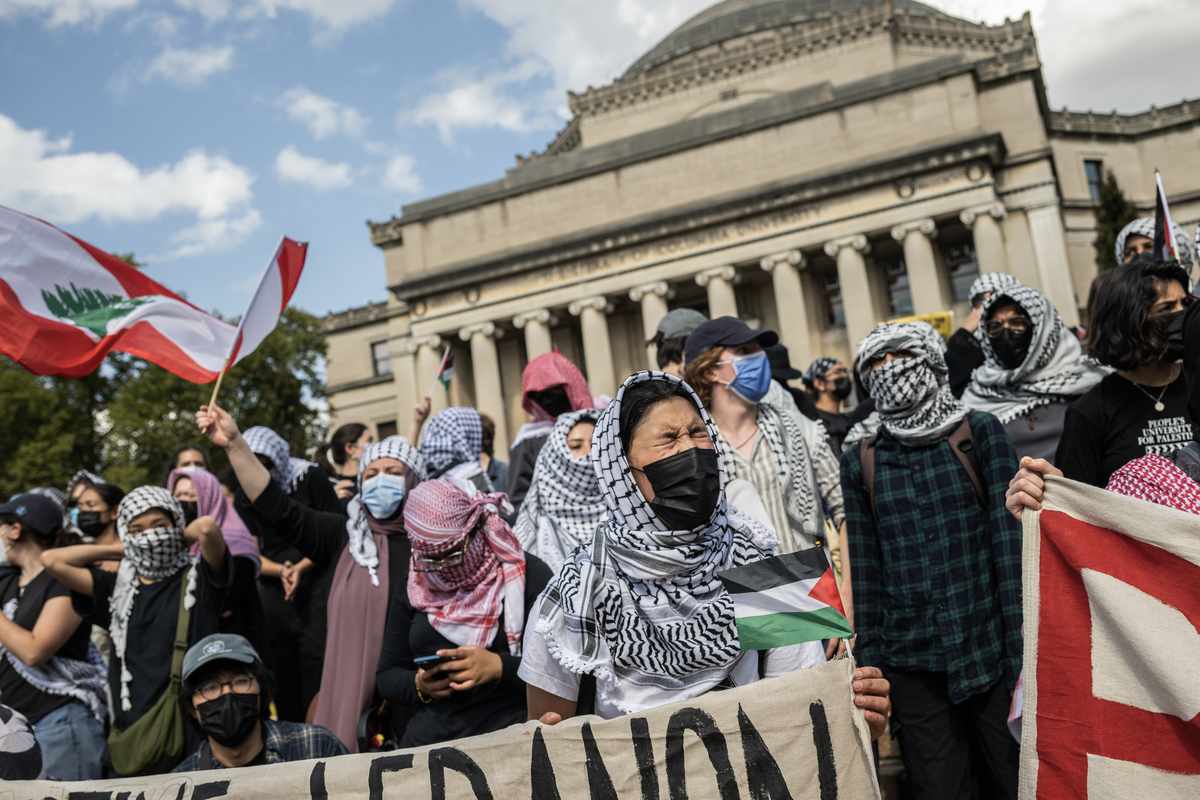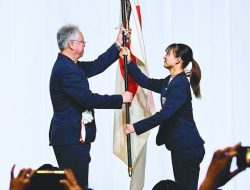
Students at Columbia University in New York protest the war in Gaza on the first anniversary of the Oct. 7, 2023, Hamas attack on Israel.
13:40 JST, November 11, 2024
When antiwar protests disrupted campuses nationwide last year, signs and chants demanded “Divest!” and “Cease-fire now!” This fall, much of the protest language has grown darker, celebrating the Oct. 7, 2023, attack, echoing language used by Hamas and declaring, “Glory to the resistance!”
Mass protests and crackdowns that engulfed colleges in the spring have dissipated, and campuses are far calmer and quieter this fall. But at some schools, student groups have struck a strikingly more militant tone.
Earlier messages were not gentle – Israel’s actions were regularly dubbed “genocide” – but until recently few had openly endorsed Hamas and its leaders.
To some, including many in the Jewish community, it’s an alarming shift. But to others, the new rhetoric is the natural evolution of a movement responding to a brutal war now in its second year, with no end in sight.
Groups often escalate rhetoric when they haven’t achieved their goals, with a small faction urging stronger action, said Mitchell Silber, an adjunct associate professor at Columbia University who runs a nonprofit helping provide security for Jewish communities in the New York metropolitan area.
“We’re at that inflection point,” he said. “We’re starting to see a radicalization of their message.”
Silber, a former director of intelligence analysis at the New York Police Department, sees starker rhetoric: “Blatantly pro-Hamas, blatantly pro-Hezbollah, blatantly pro-Houthis.”
The harsher messaging may soon collide with the incoming Trump administration. President-elect Donald Trump has promised to crack down on campus protests, and his allies expect the Department of Education to more aggressively investigate university responses to pro-Palestinian movements on campuses.
“If you get me reelected, we’re going to set that movement back 25 or 30 years,” Trump told donors in May. He also promised to deport foreign students who participate in protests. “As soon as they hear that, they’re going to behave.”
The messages sometimes appear on social media including Telegram and Instagram, and sometimes at public events. Colleges have repeatedly said they do not condone violence but they have also said they respect students’ right to free speech.
New rules have constrained how groups can protest on many campuses, and the large encampments that disrupted campus life in the spring have not returned. There are also more organized efforts to channel student and faculty concerns over issues in the Middle East into academic debate, said Ted Mitchell, president of the American Council on Education.
Though fewer students are participating in antiwar efforts this year, many of those who remain are more radical in their messaging, some observers say.
At the University of California at Berkeley a year ago, students hung a long banner from Sather Tower, an iconic 307-foot bell tower on campus. It read: “Cease fire now. Free Gaza,” with an image of the Palestinian flag. This fall, that banner was gone and a new one was hung in its place, reading: “Glory to the Resistance,” with an inverted red triangle, a symbol Hamas has used to identify military targets and that has come to be associated with the Palestinian resistance movement.
On Instagram, the Swarthmore College Students for Justice in Palestine chapter called Oct. 7 a “glorious day” and declared: “Happy October 7th everyone!”
Some protesters now refer to the Oct. 7 attacks as the “al-Aqsa flood,” the name Hamas uses. On the first anniversary of the attacks, a protester at Columbia University, marching with a noisy throng through the center of campus, held aloft a sign that included drawings of a paraglider, an inverted red triangle, and the message, “LONG LIVE THE AL-AQSA FLOOD / GLORY TO THE RESISTANCE.”
Students involved in the protest groups say the move toward more militant rhetoric is the result of frustration over a war that shows no signs of ending soon.
The news from the Middle East has been incendiary in recent weeks, with the killing of Hamas leaders, Israeli incursions into Lebanon, attacks on Iranian targets and gruesome videos of civilians dying.
Students now think it will take tougher actions to bring about change, and they are no longer willing to practice “respectability politics,” said Matt Kovac, a graduate student in history at Berkeley who helps run the campus chapter of Students for Justice in Palestine.
“What we are witnessing is a realistic response to people marching and protesting for a year, and that these international institutions and the U.S. have no interest in a cease-fire,” he said. “They’ve had a year.”
At Baruch College in New York City, Jewish students feel personally under attack, said sophomore Aidan Herzlinger, vice president of the school’s Hillel chapter. At a welcome dinner for new students at an off-campus restaurant, the group was met by pro-Palestinian protesters from their school, chanting loudly on the sidewalk. Herzlinger said the Jewish students were called “baby killers” and “terrorists.”
In an Instagram post, the campus chapter of Students for Justice in Palestine said the protest was within legal bounds and meant to target “genocide enablers,” specifically naming several Hillel staff members and one student – Herzlinger – and complaining that Hillel sends students on “propaganda trips” to Israel.
Then, the day before the Oct. 7 anniversary, he found the words “Oct 7 IS FOREVER” spray-painted on a wall at the entrance to the college.
“They’re becoming more radical, they’re becoming more extreme, and they’re doing things that are just a thousand-fold worse than they were last year,” Herzlinger said. He said he feels isolated and unsafe as a result.
“These institutions are supposed to be places of inclusiveness and open dialogue and respectful disagreement,” he said. “They’ve created the opposite.”
Without doubt, many activists for Palestinians are engaged in entirely peaceful protests: calling for a cease-fire, writing divestment proposals, organizing teach-ins and film screenings, and creating art and embroidery together. Some groups have hosted vigils for those who have died in the war in Gaza; at Columbia, students have read thousands of names aloud. And some groups marked the Jewish holiday Sukkot with interfaith gatherings.
“Overwhelmingly, we have seen that student-led protests are peaceful calls for human rights for those in Palestine,” said Farah Afify, research and advocacy coordinator for the Council on American-Islamic Relations. “And of course, they are increasing in urgency as the situation continues to deteriorate abroad.”
Others who followed the protests closely said they have seen signs of support for terrorist groups all along. Oren Segal, vice president of the Center on Extremism at the Anti-Defamation League, a Jewish civil rights group, said certain student groups or individuals defended the Oct. 7 attack from the start.
“Before the blood even dried in Israel, we saw the glorification of the violence on that day,” he said.
He worries that the inflammatory rhetoric could normalize terrorist groups and spark someone to act on those messages. “The blatant support for terror is not something I have ever seen in my over 20 years of doing this,” he said.
A turn at Columbia
The shift is perhaps most apparent at Columbia University, the epicenter of last year’s protests.
For weeks, Columbia University Apartheid Divest, one of the pro-Palestinian groups on campus, has taken a harder tone across its communication channels. On Substack, the group has praised the leadership of Hamas, Hezbollah and Ansarallah (more commonly known as the Houthis), all Iranian-backed groups designated by the United States as terrorist organizations. One post referred to these groups as the Axis of Resistance and said they had “effectively used hierarchy and structured organization led by an anti-imperialist political line to carry out operations effectively.”
On a Telegram channel with more than 7,700 subscribers, CUAD has praised and posted quotes and photos from Yahya Sinwar, the leader of Hamas and mastermind of the Oct. 7 attacks who was killed by Israeli forces last month.
And in October, the group rescinded an apology it posted in the spring after one of its members, Khymani James, said during a disciplinary hearing that “Zionists don’t deserve to live” and “be grateful that I’m not just going out and murdering Zionists.”
Last month, CUAD apologized to James for posting the apology on his behalf. James replied on Twitter with gratitude that the record was set straight. “Anything I said, I meant it,” James said.
When demonstrations broke out last year at Columbia, some people labeled protesters as pro-Hamas, said Brian Cohen, the Lavine Family Executive Director of the Kraft Center for Jewish Student Life, but he was careful not to, because he didn’t see any direct correlation.
Now, he said, “there’s no denying it.”
A spokesperson for Columbia said that calls for violence have no place at the school and that they are “antithetical to the core principles upon which this institution was founded.”
Leaders of CUAD did not respond to requests for comment.
But in interviews, students on other campuses explained their thinking.
Students for Justice in Palestine at California State Polytechnic University at Pomona is one of many chapters that posted positive messages about Sinwar after his killing by Israeli military forces. On Instagram, the group posted his photo with the words: “The face of the resistance. Martyred while fighting for our liberation. Rest in power,” followed by a heart emoji.
Mya Ammari, a Palestinian American who is president of the chapter, said that last year “people were a lot more afraid of speaking out.” Now, she said, “people eventually became fed up and say what’s on their mind.”
Asked if this could be read as supporting terrorism, she said, “One man’s terrorist is another man’s freedom fighter.” Like other pro-Palestinian activists, she argued that focusing on the Oct. 7 attacks was unfair and that this day must be understood in the context of a long history of oppression.
A member of the leadership team with Mac for Palestine at Macalester College in St. Paul, Minnesota, made a similar point. Terms like “terrorism” are “losing persuasive power among students,” because they are applied to violence perpetrated by Palestinians but not violence perpetrated by Israel, said Oriane Sachs-Bernstein, a junior at Macalester.
She said that students’ experience on campus with the protest movement, including “intense surveillance, violent policing, brutalizing arrests and threats to their education or even personal safety,” has changed the way they see the Palestinian struggle. She said that students realize they are experiencing “just a sliver of the intense repression that defines Palestinian existence under occupation” and that “this form of repression is radicalizing.”
Still, she said, the group’s posts about Sinwar’s life were not meant as an endorsement of Hamas.
This new messaging has been noticed by Hillel chapters across the country, said Adam Lehman, president and CEO of Hillel International.
“The overall picture on campus,” he said, “has moved from a mass protest movement that embodied a diverse set of goals and rhetoric to this more concentrated and therefore more extreme and radical set of goals, tactics and rhetoric.”
Top Articles in News Services
-

Survey Shows False Election Info Perceived as True
-

Hong Kong Ex-Publisher Jimmy Lai’s Sentence Raises International Outcry as China Defends It
-

Japan’s Nikkei Stock Average Touches 58,000 as Yen, Jgbs Rally on Election Fallout (UPDATE 1)
-

Japan’s Nikkei Stock Average Falls as US-Iran Tensions Unsettle Investors (UPDATE 1)
-

Trump Names Former Federal Reserve Governor Warsh as the Next Fed Chair, Replacing Powell
JN ACCESS RANKING
-

Producer Behind Pop Group XG Arrested for Cocaine Possession
-

Japan PM Takaichi’s Cabinet Resigns en Masse
-

Man Infected with Measles Reportedly Dined at Restaurant in Tokyo Station
-

Israeli Ambassador to Japan Speaks about Japan’s Role in the Reconstruction of Gaza
-

Videos Plagiarized, Reposted with False Subtitles Claiming ‘Ryukyu Belongs to China’; Anti-China False Information Also Posted in Japan























